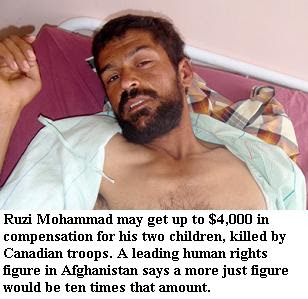Australians oppose Afghan war
In a shift of opinion, a major foreign policy survey has found that a majority of Australians are against that country's involvement in the war in Afghanistan:
Canberra TimesIn a virtual echo of similar findings in Canada, the news was accompanied by lamentation that the mission has not been explained well to Australians. Some reactions, however, showed more courage. Richard Tanter of Australia's Nautilus Institute articulates what many Australians are feeling:
Australians lose faith in Afghan war effort
By Philip Dorling
Sept 30 - Almost two in three Australians think the country's foreign policy places too much emphasis on the United States, and most people now oppose military involvement in Afghanistan...
Opposition to the war in Afghanistan has grown significantly, despite bipartisan support for Australia's involvement from the Labor Government and the Coalition Opposition.
Of those surveyed, 56 per cent opposed Australia's military commitment, and 42 percent expressed support.
Asked why Australia was involved, 38 per cent referred to Australia's alliance with the US, 35 per cent cited fighting terrorists and only 17 per cent said the aim was to support a democratic Afghan government... (link)
"I think we are making no positive contributions to the possibility of peace there and what is really important is to foster a domestic internal Afghan peace process, and unfortunately we are no longer in the position of being an honest broker." (link)Addendum (from Angus Reid):
Polling Data
Should Australia continue to be involved militarily in Afghanistan?
| 2008 | 2007 | |
| Yes | 42% | 46% |
| No | 56% | 46% |
| Don’t know | 3% | 8% |
| Refused | -- | 1% |
Source: Field Works Market Research / Lowy Institute for International Policy
Methodology: Telephone interviews with 1,001 Australian adults, conducted from Jul. 12 to Jul. 27, 2008. Margin of error is 3.1 per cent.












terry_price said...
While any civilian death is tragic and, at one level, of inestimable value, there is evidence Canada is paying more than the amounts you're mentioning.
"Afghan families got up to $9,000 each for losing a family member...."
"Forces paid for friendly-fire deaths, files show," Globe & Mail, Apr 23/08
"...Canadian officials say they have talked to Muhammed and offered him their condolences. They have also started the process of deciding whether to pay compensation which, in past accidental killings, has ranged from $2,000 to $9,000..."
"'. . . I will kill Canadians'," National Post, Jul 31/08
September 23, 2008 4:23 AM